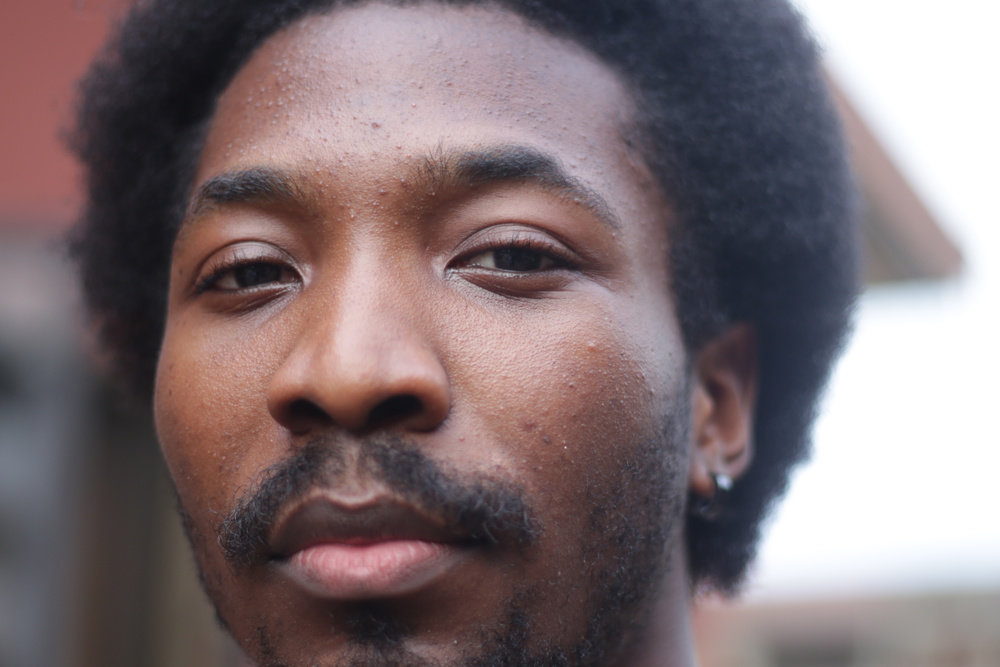Global Beat: Made Kuti

photo credit: Optimus Dammy
Made Kuti never had any doubt: He too would become a musician. His grandfather, the late Fela Anikulapo Kuti, is arguably the most important musical artist that Nigeria has ever produced, a pioneer of the Afrobeat style. Made’s father, Femi Kuti—Fela’s oldest son, born in London but raised in Lagos—has carried on that tradition, and is currently one of the genre’s most revered ambassadors. Seun Kuti, Fela’s youngest son, is also in the family business, leading his father’s former band, Egypt 80. And Made (pronounced mah-day) felt the calling from early childhood.
“My most vivid memories start when I was five,” he says, “when I would go to the [New Afrika] Shrine,” the landmark entertainment center in Lagos managed by Femi. Made lost his grandfather when he was only two, and he admits: “Before I really understood who Fela was and what he did, my immediate exposure to the Kuti family was my dad. Four times a week, I would watch as 2,000 people came to see him play. I was very free as a child to do anything that I wanted, and there were very few adults that I had to answer to so, at five, I started playing the trumpet.”
Now, at 25, Made Kuti has released his debut album, For(e)ward. It builds on the Afrobeat traditions established by Fela and Femi Kuti but, as its title suggests, modernizes them. In an unusual but savvy marketing move, For(e)ward has been released in a package along with Femi’s new album, Stop the Hate. “It was a total coincidence at the start,” Made explains. “My dad was starting an album, and he knew that I was starting my debut album. The thought occurred to him: ‘What if we both released them at the same time?’ He said he didn’t think it had ever been done before.”
Playing the two albums in sequence reveals as many similarities as differences. While Femi’s recording sticks closer to the conventions of Afrobeat as established by Fela—funky, horn-saturated jams, outspoken lyrical content that’s still built for a sweaty good time—Made’s incorporates other stylistic elements and rhythms, some of which reflect his travels (he spent several years studying in London). Made’s own lyrical paths veer from the sociopolitical nearly as often as they return there. “Different Streets,” the album’s longest track at nearly eight minutes, is a deep dive into the worlds of jazz and hip-hop that still retains its rhythmic, Afrobeat roots.
Within the song, Made makes direct reference to his grandfather’s impact: “A prophet is what many of us call Fela,” he talk sings, “Someone with very special skills to see very far/ But grandpa was not predicting the future with songs/ He was speaking about everything he saw, everything that was wrong.”
Several tracks on For(e)ward delve into similarly timely and topical issues—“Hymn,” which includes a choir composed of Kuti children, asks why “some children grow up to be big and strong” while others “don’t have enough food to eat.” However, other tunes carry a less weighty if still direct message: The opener, “Free Your Mind,” contains little more than the phrase “Free your mind and set your soul free.”
Notably, the younger Kuti made nearly all of this music by himself—literally. He plays not only the trumpet on the album but all the keyboards, guitars, saxophones, drums and percussion—and, of course, he provides all of the vocals heard on the record, save for those of the Kuti children. He also composed and arranged each of the tunes.
One ardent fan who isn’t surprised by these accomplishments is Femi Kuti. “He always showed great interest and enthusiasm in music, so I’ve always known to just give him all the tools he needed,” says Made’s dad. “It’s a great album. Listeners can hear the roots and the lessons he’s learned from me and his grandfather, but they can also feel and hear that he’s pushing the boundaries further. His songs are inspirational and the creation is very fresh.”
Beginning in his teens, Made also honed his skills by playing in Femi’s band, paying careful attention both on and off the stage. “My father has always been my number-one supporter from the day I was born.” Made says. “What I learned most from him is integrity—the true belief that what you’re doing has purpose and to love it, regardless of the fame and money and all the good things. You might go on tour for one month, with little food to eat, struggling through every show, but the moment you climb onto that stage, you pull out everything that you have. With my father, we do it every night. Every night.”
Now, of course, it’s up to Made where he goes with the gifts he’s inherited. What does he hope to give audiences that are just starting to discover him?
“I really just want people to enjoy it and for people that don’t know a lot about Nigeria to learn from it, and know that every song is about finding truth in some way, especially when the truth is being disguised,” he explains.
It’s a sentiment that has been common to Kuti-made music for at least a few generations now. The comparisons are inevitable, but Made brushes them off. “I can never be exactly as Fela,” he says. “He’s a different person and you can’t do anything exactly as another person. As much as I love them, I am different from my father and my grandfather—not only in music but also in daily life. I am different in the way that I talk, the way that I walk, my actions. And if I’m being honest with myself, my music is not the same as well.”
But what would Fela think of his grandson’s artistry? “He would be very proud and most likely cry tears of joy,” says Femi Kuti, spoken like a true dad.




















